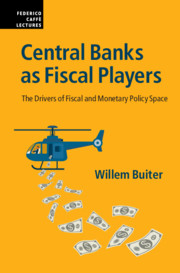Book contents
- Central Banks as Fiscal Players
- Federico Caffè Lectures
- Central Banks as Fiscal Players
- Copyright page
- Dedication
- Contents
- Figures
- Tables
- Introduction
- 1 The Central Bank Balance Sheet: Why It Matters
- Appendix to Chapter 1: Stochastic Discount Factors
- 2 A Stylized Set of Accounts for the Treasury, the Central Bank and the State
- 3 Helicopter Money Drops
- 4 The Fallacy of the Fiscal Theory of the Price Level – and Why It Matters
- Appendix to Chapter 4: A Formal Approach to the FTPL
- 5 Life at the Zero Lower Bound and How to Escape from It
- 6 Why the Eurosystem Isn’t a Proper Central Bank – and How to Make It One
- References
- Index
4 - The Fallacy of the Fiscal Theory of the Price Level – and Why It Matters
Published online by Cambridge University Press: 02 November 2020
- Central Banks as Fiscal Players
- Federico Caffè Lectures
- Central Banks as Fiscal Players
- Copyright page
- Dedication
- Contents
- Figures
- Tables
- Introduction
- 1 The Central Bank Balance Sheet: Why It Matters
- Appendix to Chapter 1: Stochastic Discount Factors
- 2 A Stylized Set of Accounts for the Treasury, the Central Bank and the State
- 3 Helicopter Money Drops
- 4 The Fallacy of the Fiscal Theory of the Price Level – and Why It Matters
- Appendix to Chapter 4: A Formal Approach to the FTPL
- 5 Life at the Zero Lower Bound and How to Escape from It
- 6 Why the Eurosystem Isn’t a Proper Central Bank – and How to Make It One
- References
- Index
Summary
Chapter 4 reviews how not to use the intertemporal budget constraint (IBC) of the State. It analyses why the fiscal theory of the price level (FTPL) is fatally logically flawed: it confuses the IBC of the State with a mis-specified equilibrium nominal government bond pricing equation.
The FTPL generates a number of anomalies and inconsistencies.
Anomaly 1: The price level can be negative.
Anomaly 2: If the public debt is index-linked and/or denominated in foreign currency, there is no FTPL.
Anomaly 3: The FTPL can price phlogiston – it can determine the general price level for a model in which money exists only as a numeraire.
Anomaly 4: If the logic of the FTPL holds, we could also have the Mrs. Jones Theory of the Price Level.
Anomaly 5: When we use the IBC of the State as an equilibrium sovereign debt pricing equation in the proper manner, the FTPL vanishes.
Anomaly 6: When viewed as an equilibrium selection criterion, the FTPL in general produces explosive or implosive solutions for the general price level and the rate of inflation when the nominal money stock is constant.
Inconsistency 1: If the FTPL is imposed as another equilibrium condition when the nominal money stock is exogenous and the fundamental equilibrium has been selected, then the model is overdetermined.
Inconsistency 2: When the price level is predetermined the FTPL results in an overdetermined system.
- Type
- Chapter
- Information
- Central Banks as Fiscal PlayersThe Drivers of Fiscal and Monetary Policy Space, pp. 89 - 118Publisher: Cambridge University PressPrint publication year: 2020



